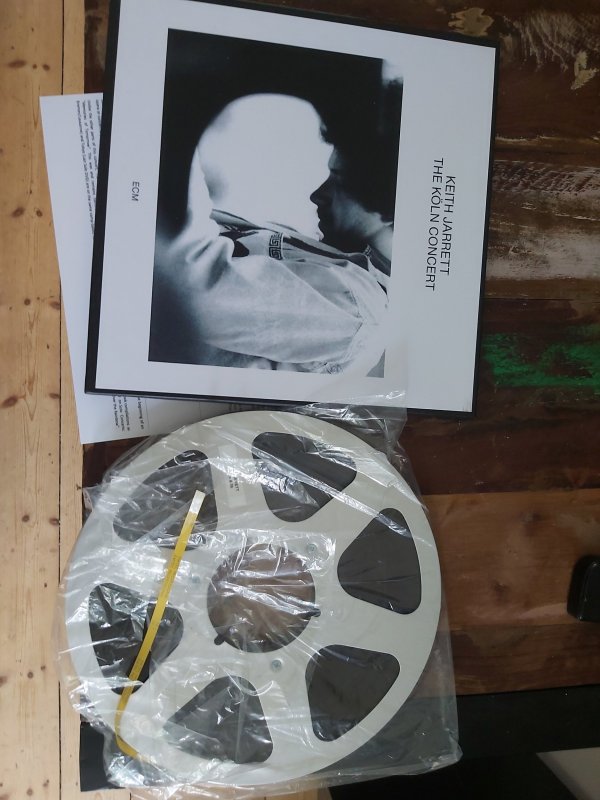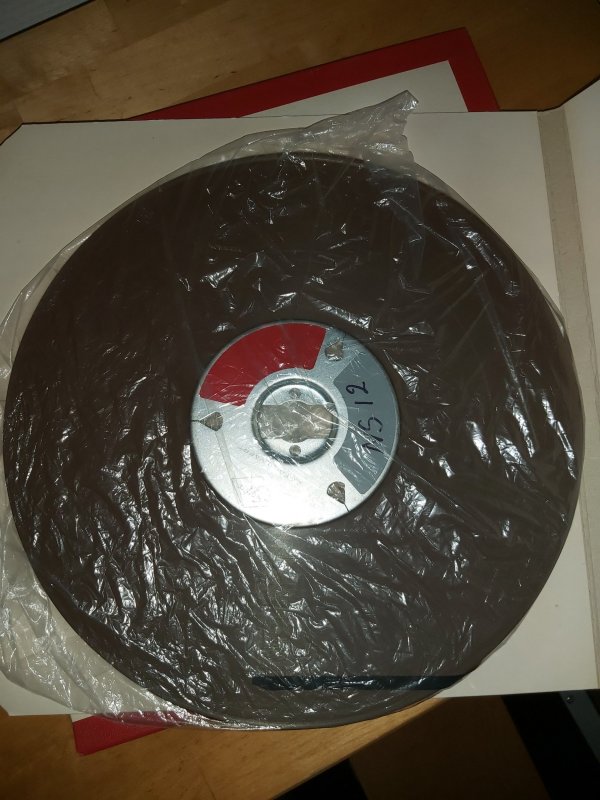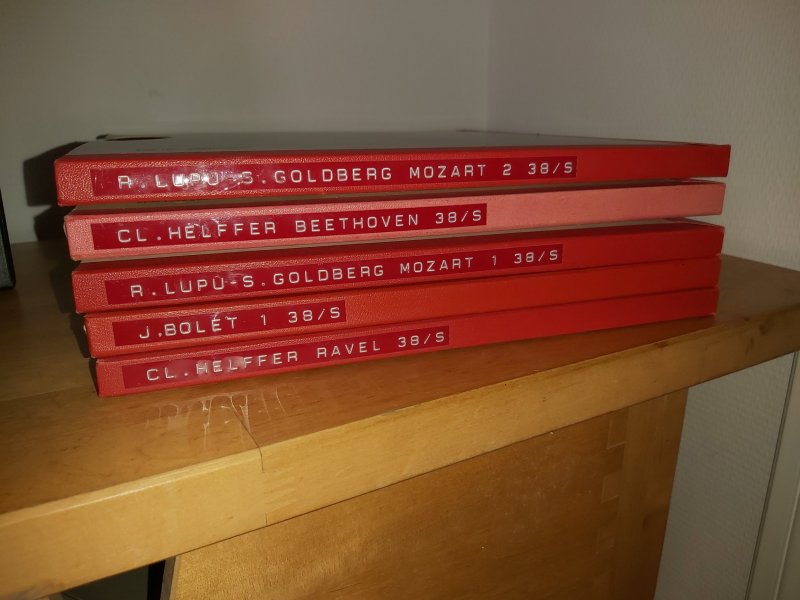ECM records and other labels / studios recording techniques discussion
- Thread starter andromedaaudio
- Start date
You are using an out of date browser. It may not display this or other websites correctly.
You should upgrade or use an alternative browser.
You should upgrade or use an alternative browser.
Last edited:
Could well be , the best was probably done before ( commercial ) " managers took overI believe the "magic" period in recording was from 1955 to 1965.
And that goes for every business
There was still phenomenal recording techniques, especially in Jazz during 1970's and 1980's. ECM, Strata East, Black Jazz, etc.I believe the "magic" period in recording was from 1955 to 1965.
Undoubtedy but my sonic preferences for jazz and classical tend to gravitate to that period maybe due to simple miking technique (think Mercury Living Presence and RVG Blue Note issues) and lack of current (more complex?) recording technology. I think this is another good example of less is more. And I have numerous ECM CD's and they are consistently very good to excellent compared to the competition.
Last edited:
There was still phenomenal recording techniques, especially in Jazz during 1970's and 1980's. ECM, Strata East, Black Jazz, etc.
And there are still phenomenal recording techniques today, both in jazz and classical. I don't get the obsession with a "golden age", neither in recording nor in musicianship.
In classical music some talk about a "golden age" in performance, but a lot of today's musicians deliver interpretations that stand on their own in excellence. And the technical capabilities of today's classical musicians are on average often better than those of yesteryear. A professor at the conservatory of Graz University (Austria) told my father and me, on the occasion of a student concert there, that what students used to play decades ago as their final exam, they now have to play as their entrance exam. But it's not just technical excellence, a lot of today's interpretations are amazing musically.
I will stay out of discussing classical music recordings, as i don't know enough about them. But when it come to Jazz, rock and pop music i think it has a lot to do with analog recording and mixing, the recording made earlier where less prone to have been manipulated heavily, and the amounts of recording tracks where also very limited, wich in my opinion makes for better sounding recordings. I understand that it is not necessarily readily noticeable if you use a predominantly digital playback chain. Maybe there has also been a loss of knowledge when it come to fabrication of good vinyl, or the "modern" vinyl sound carrie the imprint of the mastering that has been done in the digital domain. I am not saying all modern vinyl is bad, but i almost always prefer older originals to the remasters.And there are still phenomenal recording techniques today, both in jazz and classical. I don't get the obsession with a "golden age", neither in recording nor in musicianship.
In classical music some talk about a "golden age" in performance, but a lot of today's musicians deliver interpretations that stand on their own in excellence. And the technical capabilities of today's classical musicians are on average often better than those of yesteryear. A professor at the conservatory of Graz University (Austria) told my father and me, on the occasion of a student concert there, that what students used to play decades ago as their final exam, they now have to play as their entrance exam. But it's not just technical excellence, a lot of today's interpretations are amazing musically.
I will stay out of discussing classical music recordings, as i don't know enough about them. But when it come to Jazz, rock and pop music i think it has a lot to do with analog recording and mixing, the recording made earlier where less prone to have been manipulated heavily, and the amounts of recording tracks where also very limited, wich in my opinion makes for better sounding recordings. I understand that it is not necessarily readily noticeable if you use a predominantly digital playback chain. Maybe there has also been a loss of knowledge when it come to fabrication of good vinyl, or the "modern" vinyl sound carrie the imprint of the mastering that has been done in the digital domain. I am not saying all modern vinyl is bad, but i almost always prefer older originals to the remasters.
Rock and pop recordings are a thing in itself, and I have not talked about them. Many sound awful, and even many older rock and pop recordings sound mediocre at best (adding insult to injury, in the vinyl format they often are presented on inferior pressings). There are some good, or relatively good, rock and pop recordings, both older and more modern, but they are not in the majority it seems.
Good, mediocre and bad recordings are discernible in any format, analog or digital.
There is a certain "magic" to the older analog recordings that just does not translate well into the digital formate once transferred.Rock and pop recordings are a thing in itself, and I have not talked about them. Many sound awful, and even many older rock and pop recordings sound mediocre at best (adding insult to injury, in the vinyl format they often are presented on inferior pressings). There are some good, or relatively good, rock and pop recordings, both older and more modern, but they are not in the majority it seems.
Good, mediocre and bad recordings are discernible in any format, analog or digital.
There is a certain "magic" to the older analog recordings that just does not translate well into the digital formate once transferred.
For good rock and pop recordings I might agree in a number of cases. Classical usually fares better, but it depends.
There is a certain "magic" to the older analog recordings that just does not translate well into the digital formate once transferred.
Are you addressing the "transparency" of formats or simply preference?
In an hobby where the same person has several turntables and cartridges to please his preferences I easily accept many of us will prefer the added magic of the LP - for some specific recordings I own I really prefer it. In fact I read that many people prefer home carried ripping of their LPs to HiRez files.
There is also the issue of dynamic compression. Some older rock or pop recordings are dynamically compressed on digital (loudness wars); in that case the vinyl will be preferable. On the other hand, some older orchestral recordings are dynamically compressed on vinyl in order to fit the format, and the digital transfer with its wide dynamic range appears to be more faithful to the original analog master tape.
Transparency ? Or the way the treble energy comes trough in a different way, affecting especially brass and drums, but only on good recordings. And i am not a horn /SET userAre you addressing the "transparency" of formats or simply preference?
In an hobby where the same person has several turntables and cartridges to please his preferences I easily accept many of us will prefer the added magic of the LP - for some specific recordings I own I really prefer it. In fact I read that many people prefer home carried ripping of their LPs to HiRez files.
Plenty of older analog rock and pop recordings with thin tinny sound, often from the mixer pult. Marc seems to love theseThere is also the issue of dynamic compression. Some older rock or pop recordings are dynamically compressed on digital (loudness wars); in that case the vinyl will be preferable. On the other hand, some older orchestral recordings are dynamically compressed on vinyl in order to fit the format, and the digital transfer with its wide dynamic range appears to be more faithful to the original analog master tape.
Sometimes I think a lot of audiophiles, particularly among the vinylistas, who seem to be a little lost in a "Golden Age" nostalgia haze. In the world of jazz and classical there are many superb recordings/performances from labels that have produced consistent quality over the last 20 years and ongoing today.
Sometimes i think a lot of audiophile, especially the digital only crowd do not get the "golden age recording " appreciation, because their systems are not capable of capturing what makes them special, even after the last 15 switch, power-supply and USB card upgrades ! 
Sometimes I think a lot of audiophiles, particularly among the vinylistas, who seem to be a little lost in a "Golden Age" nostalgia haze. In the world of jazz and classical there are many superb recordings/performances from labels that have produced consistent quality over the last 20 years and ongoing today.
It is in vinylistas' self-interest to perpetuate the "Golden Age" nostalgia. After all, there are no analog recordings since the late 70s / early 80s, certainly in classical music. Who would want to admit that the world has moved on with continued excellence, if you can perpetuate a myth instead? This is not to diminish the many great classical recordings of the past in any way -- they still remain great today, and should be enjoyed as such; I certainly do -- but time does not stand still.
And hey, there is great new classical music written after 1980, too. I am listening to it all the time -- not just (hardcore) avant-garde, but more "conventional" music as well.
Sometimes I think a lot of audiophiles, particularly among the vinylistas, who seem to be a little lost in a "Golden Age" nostalgia haze. In the world of jazz and classical there are many superb recordings/performances from labels that have produced consistent quality over the last 20 years and ongoing today.
Over 20 years yes, over 60 no
Similar threads
- Replies
- 203
- Views
- 8K
- Replies
- 6
- Views
- 343
- Replies
- 220
- Views
- 8K
- Replies
- 28
- Views
- 2K
| Steve Williams Site Founder | Site Owner | Administrator | Ron Resnick Site Owner | Administrator | Julian (The Fixer) Website Build | Marketing Managersing |










